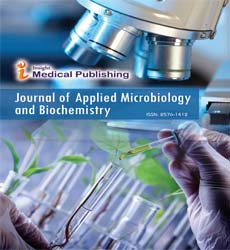ISSN : ISSN: 2576-1412
Journal of Applied Microbiology and Biochemistry
Preserving Antibiotic Efficacy Challenges and Opportunities in Modern Medicine
Yanina Aleksey*
Department of Microbiology, Southern Federal University, Rostov-on-Don, Russia
- *Corresponding Author:
- Yanina Aleksey
Department of Microbiology, Southern Federal University, Rostov-on-Don,
Russia,
E-mail: aleksey@foxmail.com
Received date: March 18, 2024, Manuscript No. IPJAMB-24-18996; Editor assigned date: March 21, 2024, PreQC No. IPJAMB-24-18996 (PQ); Reviewed date: April 04, 2024, QC No. IPJAMB-24-18996; Revised date: April 11, 2024, Manuscript No. IPJAMB-24-18996 (R); Published date: April 18, 2024, DOI: 10.36648/2576-1412.8.2.214
Citation: Aleksey Y (2024) Preserving Antibiotic Efficacy Challenges and Opportunities in Modern Medicine. J Appl Microbiol Biochem Vol. 8 No. 2: 214.
Description
Antibiotics have long been hailed as miracle drugs, revolutionizing modern medicine and saving countless lives. However, their effectiveness is under threat due to the rise of antibiotic resistance, a phenomenon where bacteria evolve and develop defenses against the drugs meant to kill them. This escalating problem poses a significant threat to global health, requiring urgent attention and action. Antibiotic resistance is a complex and multifaceted problem that poses a significant threat to global health and requires urgent action. By implementing comprehensive strategies focused on antibiotic stewardship, research and development, surveillance, and public education, we can work together to preserve the effectiveness of antibiotics and safeguard public health for future generations. Failure to act decisively risks returning us to a pre-antibiotic era where common infections were once again life-threatening, underscoring the critical importance of addressing antibiotic resistance as a global priority.
Understanding antibiotic resistance
Antibiotic resistance occurs when bacteria adapt and become resistant to the antibiotics designed to kill them. This adaptation can happen through various mechanisms, including mutations that render antibiotics ineffective or the transfer of resistance genes between bacteria. Misuse and overuse of antibiotics accelerate this process, creating selective pressure that favors the survival of resistant bacteria. Over prescription and misuse antibiotics are often prescribed unnecessarily for viral infections or minor illnesses where they provide no benefit. This misuse contributes to the development of resistance and reduces the effectiveness of antibiotics when they are truly needed. The widespread use of antibiotics in agriculture, particularly in animal farming for growth promotion and disease prevention, also contributes to the emergence of antibiotic-resistant bacteria. These resistant bacteria can spread through the food chain and the environment, posing a risk to human health. Inadequate infection control practices in healthcare settings can facilitate the spread of resistant bacteria among patients, leading to outbreaks and difficulty in treating infections. The interconnectedness of the modern world means that antibioticresistant bacteria can easily spread across borders through travel and trade, making it a global issue that requires coordinated international efforts to address. Increased Antibiotic-resistant infections are harder to treat and often result in prolonged illness, increased healthcare costs, and higher mortality rates. Common infections such as pneumonia, urinary tract infections, and bloodstream infections are becoming increasingly difficult to treat due to antibiotic resistance. The rise of antibiotic resistance threatens the efficacy of routine medical procedures such as surgeries, chemotherapy, and organ transplants, which rely on the ability to prevent and treat infections effectively. The economic burden of antibiotic resistance is substantial, including increased healthcare costs, lost productivity due to illness, and the need for more expensive and prolonged treatments.
Addressing antibiotic resistance
Implementing antibiotic stewardship programs in healthcare settings to promote responsible antibiotic use. Educating healthcare professionals about appropriate prescribing practices and the importance of adhering to clinical guidelines. Monitoring antibiotic use and resistance patterns to identify areas for improvement and intervention. Encouraging patient education and engagement to foster understanding of antibiotics and the risks of antibiotic resistance. Investing in research to discover and develop new antibiotics with novel mechanisms of action. Alternative approaches to combatting bacterial infections, such as phage therapy, immunotherapies, and probiotics. Promoting the development and use of non-antibiotic alternatives for infection prevention and treatment, such as vaccines and antimicrobial peptides. Supporting research into innovative technologies and therapies that target bacterial pathogens without promoting resistance. Establishing robust surveillance systems to track antibiotic use, resistance patterns, and the spread of resistant bacteria. Sharing data and information between healthcare facilities, public health agencies, and international organizations to facilitate early detection and response to outbreaks of antibiotic-resistant infections. The importance of antibiotics, the risks of antibiotic resistance, and the role of responsible antibiotic use. Engaging with healthcare providers, educators, policymakers, and community leaders to disseminate accurate information and promote behavior change. regarding antibiotic treatment. Enacting policies and regulations to restrict the use of antibiotics in agriculture and animal husbandry, particularly for growth promotion and prophylaxis. Implementing guidelines and standards for infection control and prevention in healthcare settings to minimize the spread of resistant bacteria. Providing incentives and support for the development of new antibiotics and non-antibiotic alternatives, including regulatory pathways that streamline the approval process. Sharing best practices, resources, and expertise to strengthen surveillance, research, and public health interventions. Supporting initiatives such as the Global Action Plan on Antimicrobial Resistance developed by the World Health Organization (WHO).
Open Access Journals
- Aquaculture & Veterinary Science
- Chemistry & Chemical Sciences
- Clinical Sciences
- Engineering
- General Science
- Genetics & Molecular Biology
- Health Care & Nursing
- Immunology & Microbiology
- Materials Science
- Mathematics & Physics
- Medical Sciences
- Neurology & Psychiatry
- Oncology & Cancer Science
- Pharmaceutical Sciences
